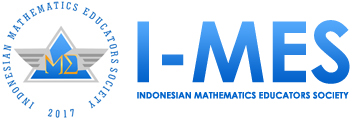Mathematical Constructs – What are These, and Their Interconnection with Ethnomathematical Concepts
Abstract
Keywords
Full Text:
PDFReferences
Abadi, M. K., Asih, E. C. M., & Jupri, A. (2018). The development of interactive mathematics learning material based on local wisdom with. swf format. Journal of Physics: Conference Series, 1013(1), 012131.
Akbar, M. N., Firman, H., & Rusyati, L. (2017, February). Developing science virtual test to measure students’ critical thinking on living things and environmental sustainability theme. Journal of Physics: Conference Series, 812(1), 012106.
Anggraini, P., & Kusniarti, T. (2015). The insertion of local wisdom into instructional materials of Bahasa Indonesia for 10th grade students in senior high school. Journal of Education and Practice (JEP), 6(3), 89-92.
Bishop, A. J. (1998). Ethnomathematics-challenging Eurocentrism in mathematics education. Zentralblatt fur Didaktik der Mathematik (International Reviews on Mathematics Education), 146-148.
Blomeke, S., Felbrich, A., Muller, C., Kaiser, G., & Lehmann, R. (2008). Effectiveness of teacher education. ZDM-The International Journal on Mathematics Education, 40, 719-734.
Clements, D. H. (2008). Linking research and curriculum development. In Handbook of International Research in Mathematics Education (pp. 589–625). Routledge.
D’Ambrosio, U. (1985). Ethnomathematics and its place in the history and pedagogy of mathematics. For the Learning of Mathematics, 2(1), 57-96.
Davis, E. K. (2016). Cultural influences on Ghanaian primary school pupils’ conceptions in measurement and division of fractions. African Journal of Educational Studies in Mathematics and Sciences, 12, 1-16.
Davis, E. K., & Hishashi, K. (2007). Country Report - Children. Paper presented at the Third workshop on the international research project towards Endogenous Development of Mathematics Education, Tokyo, Japan.
Davis, E. K., Bishop, A. J., & Seah, W. T. (2009). Gaps between inside school and out-of-school mathematics in Ghana. Mathematics Connection, 8, 1-15.
Depaepe, F., De Corte E., & Verschaffel, L. (2016). Mathematics Epistemology Beliefs: Handbook of Epistemic Cognition. Taylors and Francis.
Devkota, S. P. (2013). Ethnomathematics and multiculturalism. Open Science Repository Mathematics, (open-access), e70081969.
Farooq, M., & Shah, S. (2008). Students' attitude towards mathematics. Pakistan Economic and Social Review, 46(1), 75-83.
Feucht, F., & Bendixen, L. D. (2010). Exploring similarities and differences in personal epistemologies of U.S and German elementary school teachers. Cognition and Instruction, 28, 39-69.
Galindo, E., & Newton, J. (2017). Synergy at the Crossroads: Future Directions for Theory, Research, and Practice. Proceedings of the Annual Meeting of the North American Chapter of the International Group for the Psychology of Mathematics Education (39th, Indianapolis, Indiana, October 5-8, 2017). North American Chapter of the International Group for the Psychology of Mathematics Education.
Karki, L. B. (2017). Basic Mathematical Concepts Practiced by Danuwar Community (Doctoral dissertation, Department of Mathematics Education Central Department of Education).
Kunter, M., Klusmann, U., Baumert, J., Richter, D., Voss, T., & Hachfield, A. (2013). Professional competence of teachers: Effects on instructional quality and students’ development. Journal of Mathematics Teacher Education, 7, 473-499.
MacDonald, R., Lord, S., & Miller, E. (2019). Doing and talking mathematics: Engaging ELLs in the academic discourse of the mathematical practices. In Teaching the Content Areas to English Language Learners in Secondary Schools (pp. 119-133). Springer, Cham.
Mokgwathi, M. S., Graham, M. A., & Fraser, W. (2019). The relationship between grade 9 teacher’s and learner’s perceptions and attitudes with their mathematics achievement. International Journal of Instruction, 12(1), 841-850.
Mahpudin, M., & Sunanto, L. (2019). Ethnomathematics an alternative in the development of multicultural education at the primary school. Social, Humanities, and Educational Studies (SHEs): Conference Series, 1(2), 269-273.
Mereku, D. K., (2004). Mathematics Curriculum Implementation in Ghana 2nd ed. Accra: Danjoe.
Mereku, D. K., Nabie, M. J., Awanta, E., & Appiah, J. (2011). Report on the Workshop on Use of Child Friendly Pedagogy in Teaching JHS Mathematics. Accra: Plan International Ghana
Ministry of Education (MOE). (2012). Mathematics Syllabus for Primary Schools. Ghana
McKenney, S., & Reeves, T. C. (2014). Educational design research. In Spector J., Merrill M., Elen J., Bishop M. (Eds.), Handbook of Research on Educational Communications and Technology (pp. 131-140). New York: Springer.
Ní Ríordáin, M., Paolucci, C., & Lyons, T. (2019). Teacher professional competence: What can be learned about the knowledge and practices needed for teaching?. In Examining the phenomenon of “Teaching out-of-field” (pp. 129-149). Springer, Singapore.
Ormanci, U., & Cepni, S. (2019). A thematic review of tablet-based science education studies. Journal of Education in Science, Environment and Health (JESEH), 5(1), 36-54.
Peni, N. R. (2019). Development framework of ethnomathematics curriculum through realistic mathematics education approach. IOSR Journal of Research & Method in Education (IOSR-JRME), 9(4), 16–24.
Rivera, F., & Becker, J. R. (2008). Ethnomathematics in the global episteme: Quo vadis? Internationalisation and Globalisation in Mathematics and Science Education, 209–225. Springer Science.
Russo, J., & Hopkins, S. (2019). Teachers’ perceptions of students when observing lessons involving challenging tasks. International Journal of Science and Mathematics Education, 17(4), 759-779.
Staub, F. C., & Stern, E. (1997). Abstract reasoning with mathematical constructs. International Journal of Educational Research, 27(1), 63-75.
Sutisna, A. P., Budi, A. S., & Noornia, A. (2019). The Influence of the Realistic Mathematics Education Approach and Early Mathematical Ability to Mathematical Literacy. Int. J. Multidiscip. Curr. Res.
Sutisna, A. P., Budi, A. S., & Noornia, A. (2019). The influence of the realistic mathematics education approach and early mathematical ability to mathematical literacy. International Journal Multidisciplinary Current Research, 6, 798-801.
Widada, W., Herawaty, D., & Lubis, A. N. M. T. (2018). Realistic mathematics learning based on the ethnomathematics in Bengkulu to improve students’ cognitive level. Journal of Physics: Conference Series, 1088(1), 012028.
Zhang, J., Zhang, Z., & Ma, F. (2014). Automatic Generation of Combinatorial Test Data. Springer Berlin Heidelberg.
Refbacks
- There are currently no refbacks.

This work is licensed under a Creative Commons Attribution-NonCommercial-ShareAlike 4.0 International License.
Indonesian Journal of Ethnomathematics
Indonesian Mathematics Educators Society
Jl. Terusan Jend. Sudirman, Kec. Cimahi Tengah, Kota Cimahi, Jawa Barat 40521
E-mail: [email protected]
ISSN: 2775-8001


